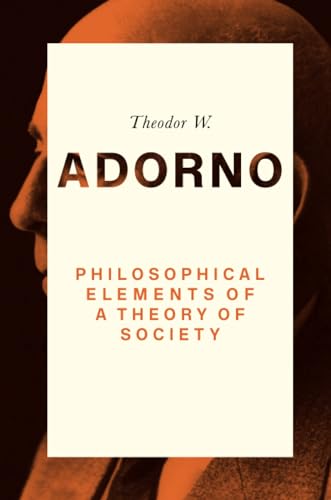Philosophical Elements of a Theory of Society
Theodor W. Adorno
BOOK REVIEW

In the intellectual labyrinth of modern thought, few figures command as much respect - or provoke as much debate - as Theodor W. Adorno. His work, Philosophical Elements of a Theory of Society, offers a scintillating glimpse into the complex interplay between society and philosophy, challenging readers to confront the very foundations of their beliefs. Adorno's inquiries are not just academic exercises; they are invitations to engage with the profound dilemmas of our time, compelling you to question the structures that shape our existence.
As you delve into this 192-page exploration, you'll find yourself face-to-face with an intricate tapestry of ideas, woven together by Adorno's critical lens. The text serves as both a philosophical treatise and a mirror reflecting the unsettling realities of contemporary society. It dares you to peel back the layers that enshroud collective thought, revealing the alienation, commodification, and cultural contradictions that permeate our daily lives.
Embodying the spirit of the Frankfurt School, Adorno's philosophical elements are a sophisticated critique of positivism and empiricism, championing a dialectical approach that encourages a critical examination of society itself. As he unfolds his arguments, the prose pulses with the energy of a thinker deeply concerned about the moral fabric of social existence, and it's impossible not to feel that urgency resonating with our current global crises.
Readers, eager to navigate the world Adorno depicts, have expressed a mix of fascination and frustration. Some hail the book as a transformative text that prompts a radical reshaping of perspectives. They find the dense, intricate arguments invigorating, embracing the challenge of wrestling with abstract concepts to grasp their relevance in real-world contexts. Yet, there are those who recoil from its complexity, calling it "esoteric" and "intimidating." Such reactions only underscore Adorno's intention: he doesn't offer comforts; he stirs discomfort, dare we say, enlightenment, through unsettling revelations.
The backdrop against which Adorno crafted his thoughts is pivotal to understanding his impact. Emerging in a post-World War II context, a period marked by rapid industrialization and cultural upheaval, his ideas resonate with profound urgency even today. The social upheavals of the 1960s, the rise of consumer culture, and the increasing alienation of individuals from communal experiences are all dynamics Adorno deftly critiques. Herein lies a vital truth: the essence of his work transcends time, speaking to the core struggles of humanity across generations.
Open the pages, and you're greeted not just by Adorno's words, but by the echoes of his influence on thinkers from Herbert Marcuse to Jürgen Habermas. How thrilling it is to trace the intellectual lineage woven through this text! It's a veritable intellectual buffet for anyone eager to witness how philosophy breeds activism - how thoughts can catalyze movements toward justice, solidarity, and dignity.
Adorno doesn't just stop at diagnosing societal ills - he lays bare the mechanisms that perpetuate them. Here lies the heart of his philosophical inquiry: the tension between individual autonomy and societal constraints, the dichotomy of enlightenment and domination. With each turn of the page, you might grapple with your role in this intricate dance; the book not only lays out a theory but urges a transformation of consciousness.
Critics might argue that Adorno's prose can feel labyrinthine, teetering on the edge of pretentiousness, but perhaps that's part of his genius. He's not merely presenting ideas to digest; he's providing a challenge, a call to scrutinize your beliefs, to engage in dialectical thinking that refuses simplistic answers. This, after all, is the hallmark of great philosophy: to unsettle and provoke, to dislodge complacency, and to ignite that spark of critical awareness within you.
Don't allow the complexities to deter you! Embrace the challenge of Philosophical Elements of a Theory of Society. Dive into Adorno's potent blend of theory and critique. With every page, you will either affirm your understanding of societal constructs or awaken to a revolutionary perspective that rattles your assumptions. Are you ready to confront the possibilities of thought in a society teetering on the edge of disarray? The invitation is open, but the journey is uniquely yours. ✨️
📖 Philosophical Elements of a Theory of Society
✍ by Theodor W. Adorno
🧾 192 pages
2019
#philosophical #elements #theory #society #theodor #adorno #TheodorWAdorno